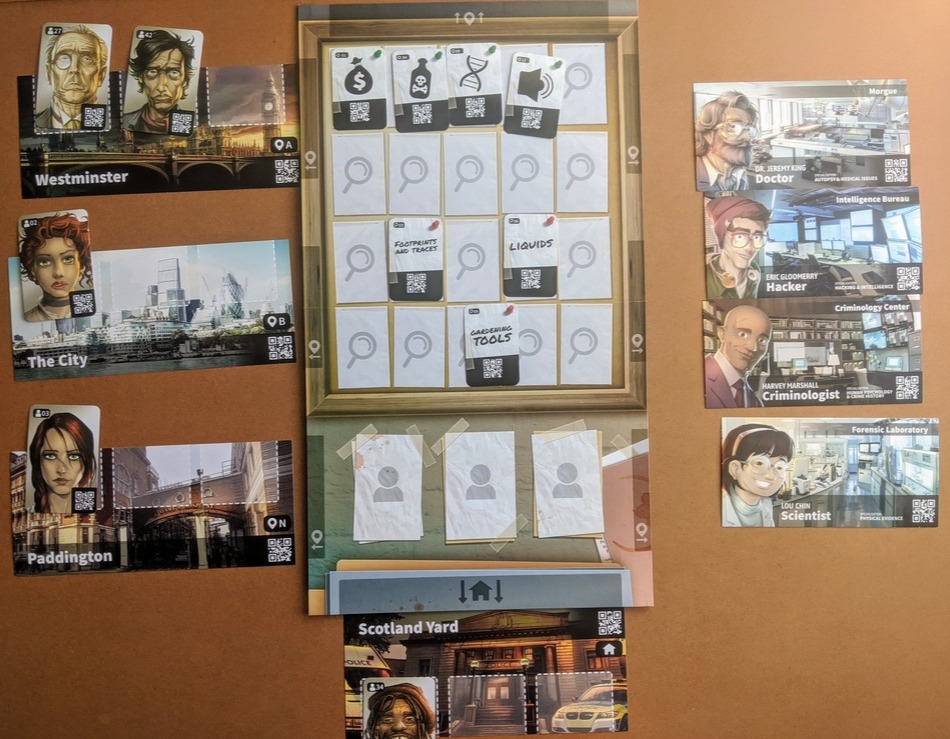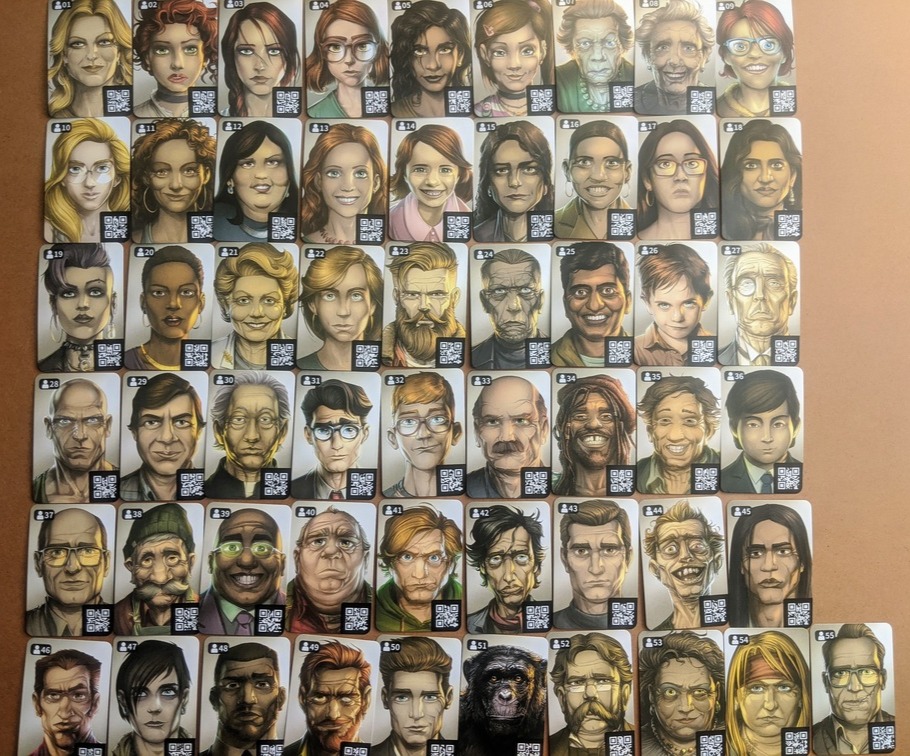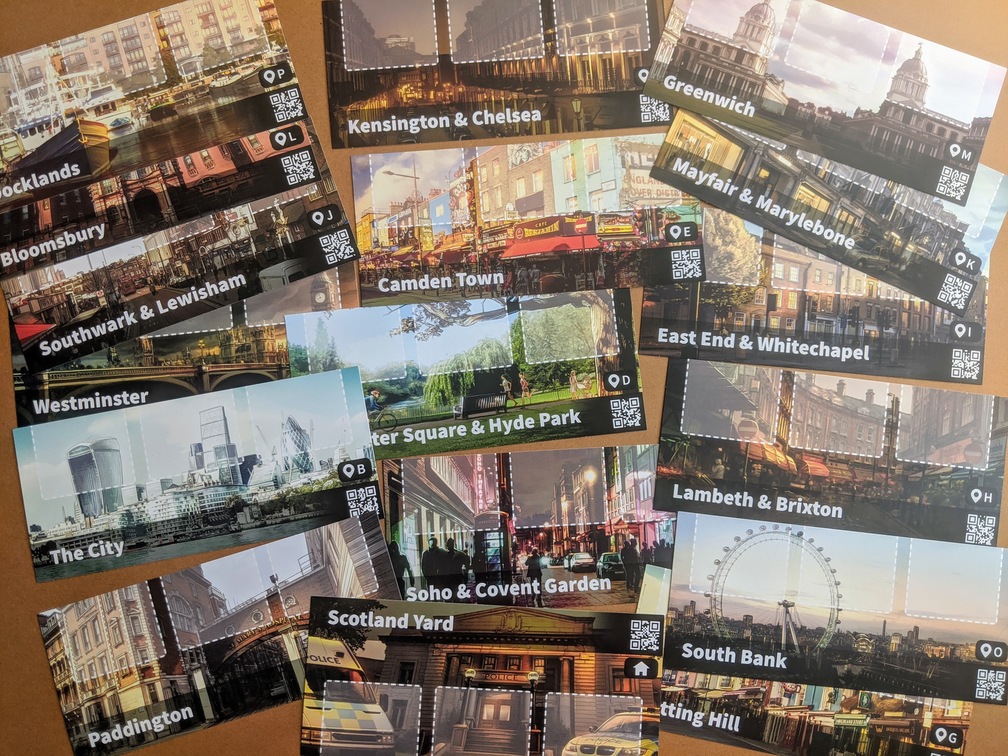“I see a bucket with a sponge…”
“Okay, that might be cleaning supplies. Got it.”
“Some letters, an old photograph.”
“Go on.”
“A weird poster, a teddy bear, some crates, bullets on the floor, a blood-stained mattress.”
“Hold on, hold on…Toy, box, ammo…okay…”
“A rubber duck.”
“A what?”
“A stuffed unicorn…”
“Okay, now you’re just screwing with me.”
Chronicles of Crime is a crime investigation board game that mixes traditional tabletop elements, an app, and, wait for it, virtual reality. Sort of. In this game the players don’t really have a character they embody, it is the same setup as in Sherlock Consulting Detective: you are part of a vague elite specialist investigator group that works with Scotland Yard.
The game design is very minimalistic, you have five decks of cards (people, locations, item categories, special items, specialists) and an app to connect it all. There aren’t really any turns in the game either, you just talk with your partners in crime, or more precisely, partners in crime prevention, and scan the cards that you think will advance your investigation. You can go to a location (by scanning the location card), interrogate a person (by scanning the person card), or check out an item (yes, by scanning the item card).

I mentioned virtual reality at the beginning, and that was a bit of an exaggeration but the feature is really cool nonetheless. When investigating a location sometimes the game gives you the opportunity to check it out in 360°, with your phone. It is a lot of fun, rotating your phone around, looking for clues, calling out what you see to your partner while they wildly search the item category deck trying to find a match.
To add some tension, the game is usually timed. You can’t go everywhere, talk to everyone, check out every location ten times. You have to make decisions and try to find the fastest way to the solution.
The Good
I have always been sceptical about app-driven games, but this one works. It is fast, seamless, drains your phone’s battery rather rapidly, a pretty solid app.
It feels like Consulting Detective on steroids. That game is all about slowly reading through pages of exposition and flourishes, while Chronicles of Crime is slick and tense and fast-paced.
This picture quite accurately represents the essence of playing Chronicles of Crime:

You have your suspects, locations, items, clues all laid out on the table in front of you while you are trying to connect the dots and piece together what happened.
The search for clues feature is amazing, it feels like you are there, combing through the crime scene, looking for evidence. And then you actually get to use your findings. For example, you might find a weird out-of-place poker chip at a cafe in Piccadilly square, which would be represented by the games & toys card, and then you can ask a bunch of people about it and someone might spill beans! It was the poker mafia all along!
The biggest issue with other investigative games is that they are mostly static. There is one dude at section E14 in the campaign book, and he will keep saying the same thing over and over again because the printed letters in the story book can’t change. But in Chronicles of Crime, the app changes your dialogue options based on the state of your investigation making the world feel realistic. This constantly shifting world state also means that you will want to go back to previously interrogated people if you find something relevant. It is also possible to stumble upon great clues when asking a random person about a random thing, just blindly fishing for hints. This all adds up to a great better “investigation” experience, making the game feel very thematic.
The app makes sure that the time pressure is real, further enhancing the theme. In Consulting Detective you would have to deduct points at the end for taking too much time, but who cares about that, you are playing for the story and the investigation, not some random number which will always be lower than Sherlock Holmes’. In Chronicles of Crime time actually goes on, some people are available at night, some during the day, and events happen, for example, more people might go missing or get murdered. The constantly ticking time also means that the game manages to avoid the point-and-click gameplay pitfall: you can’t try everything with everything, you can’t ask everyone about every single item. You have to make choices, sometimes difficult ones.

The story (we have played the first three so far) is pretty good, and more complex than the average board game. This is mainly because of the shifting world which can really only happen in an app-driven board game.
The Bad
Yes, the world is interactive, and the characters do react to what is happening, but most of them still act like NPCs. It feels like they didn’t want or had time to write potentially thousands of lines of dialogue for all cases, so you end up with situations where the opening line of a woman whose kid was just kidnapped is: “What is the topic of this discussion?” I mean, the weather I guess unless you want to talk about your missing kid.
Since sometimes the game works oh so brilliantly, it is that much more awkward when it doesn’t for some reason. Sometimes it is buggy, you know what you want but you can’t figure out how to trigger it.
The board is a bit clunky, you can’t really fit everything on it. There is also a coffee stain drawn on it, and my partner freaks out every time he sees it. It is his recurring nightmare. Coffee-stained game boards. You also don’t really need the board. It is a close contender for most useless boardgame piece ever.
Also, you can’t pack the box properly. This might hurt some people more than others.
The auto scan option in the app really drains your phone’s battery fast, but you sort of need it to make the game more dynamic, so have a charger nearby.
Lastly, the tone of the game is misleading. Based on the box you would think it is some harmless, lightweight, British cop adventure, but the stories are seriously dark. Don’t play it with small kids. Mind you, the dark tone isn’t the bad thing here, it is the misleading design.

The Co-Op
The format of the game is really free, so the alpha-player danger exists, but if you play with normal polite people it is really fun to brainstorm and bounce ideas off of each other. I think more than three people would be too chaotic, two is probably the best.
The Recommendation
Yes, we recommend it. It is really easy to play, the mechanics are very light, it could almost be a party game for two if not for the surprisingly dark themes. But hey, if a party for you means investigating child murders, I won’t judge you.
The game has two expansions out with more on the way, so if contemporary London isn’t your jam, you can check out the Noir or the American small town adventure.
All in all, this is the best detective game we have tried so far, but bear in mind that at the time of writing this review we haven’t played Detective yet.
Info
| Release Year | 2018 |
| Genre | Deduction, Storytelling |
| Difficulty | Easy |
| Number of Players | 1 to 4 |
| Length | 1 hour for a scenario |
Rating
| Overall | Good |
| Story | Great |
| Co-Operation | Good |